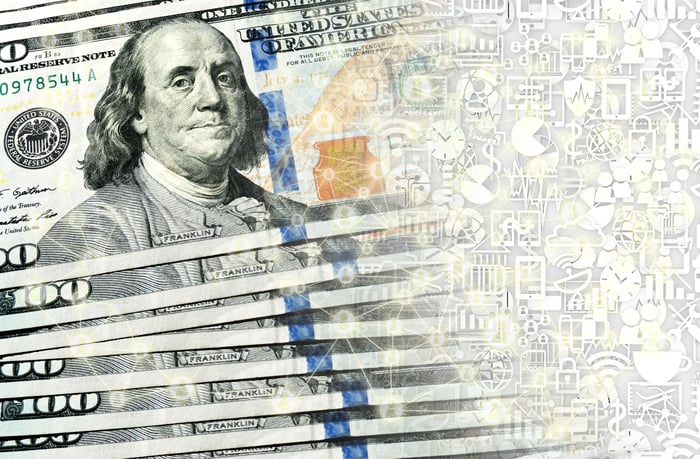For more than a century, the pathway to achieving financial independence has been to invest in the stock market. While other asset classes do have better years than the market, the historic average annual return of stocks blows other asset classes out of the water.
However, this tried-and-true thought process has been put to the test over the past decade, thanks to the rise of cryptocurrencies. Whereas the benchmark S&P 500 has delivered a total return of 26,500% since the beginning of 1965 (through this past weekend), including dividends, digital-currency Dogecoin (DOGE -1.89%) gained as much as 27,000% in just a six-month stretch between early November 2020 and early May 2021. In fact, Dogecoin has become heralded as the "people's currency" by retail investors.

Image source: Getty Images.
Dogecoin will cost retail investors a boatload of money
It's not hard to figure out why retail investors like Dogecoin -- all you have to do is quickly scour any message board on Twitter or Reddit. Generally speaking, they value its nominally low price, the incredible momentum it's shown, the support of Tesla CEO Elon Musk, and the perception of increasing adoption. While these points might sound great on paper, none of these catalysts pass the real-world sniff test.
As an example, Dogecoin's "increased adoption" is pretty much a fairy tale. It's taken eight years just for 1,400 mostly obscure businesses to accept Dogecoin. To boot, its blockchain has only been handling around 30,000 transactions daily in recent weeks, and its transaction fees are higher than a number of other cryptocurrencies with arguably superior networks. Outside of a cryptocurrency exchange, you'll find virtually no use for Dogecoin.
When it comes to Dogecoin's momentum, history tells us that all bubbles burst, without exception. The momentum chasers are clearly ignoring its lack of real-world utility, and they've swept its annual dilution of 5.2 billion tokens under the rug. Unfortunately, it's hard to hide the creation of more than 5 billion tokens annually from cryptocurrency mining.
Even the news surrounding Elon Musk appears to be nothing more than hype. With the exception of a tweet implying that Musk is working with Dogecoin developers to improve the network, nothing Musk has tweeted about the people's currency has made one sliver of difference regarding its utility or efficiency.
In other words, Dogecoin is a gigantic pump-and-dump scheme that's eventually going to collapse and cost its people a boatload of money.
These brand-name growth stocks are unstoppable
Instead of throwing money away on a hype-driven digital token with extremely limited real-world utility, investors should strongly consider buying the following trio of winning stocks. These are tried-and-true growth stocks that are sure to make you bank.

Image source: Getty Images.
Amazon
There's a very good reason Amazon (AMZN -2.32%) is one of the largest companies in the world: It's absolutely dominant in two segments.
To start with, an April report from eMarketer estimated that Amazon controlled 40.4% of all e-commerce in the United States. That's $0.40 of every $1 spent online routing through Amazon's marketplace, and it more than quintuples its next-closest competitor. Even though retail margins aren't anything to write home about, Amazon has been able to sign up over 200 million people worldwide to a Prime membership. The fees collected from Prime members help to modestly boost e-commerce margins, as well as aids Amazon in undercutting the competition on price.
What folks may not realize is that this company is also a leader in cloud infrastructure services. Amazon Web Services (AWS) grew sales by 30% in 2020 (i.e., during the worst economic downturn in decades), and first-quarter revenue came in at $13.5 billion, up 32% from the prior-year period. With $54 billion in annual run-rate revenue, AWS controls about a third of the cloud infrastructure market. That's excellent, given how much juicier cloud margins are in relation to retail and advertising margins.
Thanks in large part to AWS, Wall Street anticipates that Amazon will more than double its operating cash flow by 2025. If investors simply apply the same operating cash-flow multiple they've been comfortable with for the previous 11 years, Amazon could hit $10,000 a share by mid-decade.

Image source: Square.
Square
If you have a cryptocurrency itch that you absolulely must scratch, fintech stock Square (SQ -1.77%) is the perfect company to add to your portfolio.
Similar to Amazon, Square has two unique operations that are propelling it higher. The more mature of the two businesses is its seller ecosystem. This is the segment that provides point-of-sale devices, loans, analytics, and others tools to help merchants succeed.
In the seven years leading up to the pandemic, the gross payment volume (GPV) traversing Square's network surged from $6.5 billion to $106.2 billion. Based on the $33.1 billion in GPV in the first quarter of 2021, the company looks well on its way to topping $130 billion this year.
The interesting thing to note about the seller ecosystem is that it's driven by merchant fees. Over the past couple of years, the percentage of GPV originating from medium and large businesses has grown. This would seem to suggest that Square's seller platform has broad payment implications, and gross profit can continue to head higher.
The other operating segment people are stoked about is digital peer-to-peer payments platform Cash App. In the three-year period between the end of 2017 and the end of 2020, monthly active users more than quintupled to 36 million. At the same time, Square notes that gross profit per user hit $41, whereas acquisition cost per user came in below $5.
Cash App gives Square numerous ways to generate revenue, including merchant fees, bank transfers, investments, and Bitcoin exchange. Thanks to Cash App, Square could be one of the fastest-growing financial stocks of the 2020s.

Image source: Getty Images.
Another time-tested growth stock that should easily outpace Dogecoin is social-media giant Facebook (META -11.11%).
When the curtain closed on the first quarter, Facebook announced that it had 2.85 billion people visiting its namesake site monthly. In addition, 600 million unique users visited WhatsApp and/or Instagram, which Facebook also owns. That's 3.45 billion people, or 44% of the world's population, making use of a Facebook-owned asset at least once a month. There's simply no other social platform that attracts this many eyeballs, which is precisely why Facebook's ad-pricing power is unsurpassed.
The most amazing thing about Facebook is that it's worth $935 billion but hasn't even come close to fully monetizing its assets. It's on pace to generate well over $100 billion in ad revenue this year, nearly all of which will come from its namesake site and Instagram. Nether WhatsApp nor Facebook Messenger, two of the six most-visited social sites, have been meaningfully monetized yet.
Likewise, Facebook has other projects in the works that could prove fruitful. Sales of the company's Oculus virtual reality headsets look to be picking up, with "other" segment revenue up 146% in Q1 2021 from the prior-year period. Although Oculus represents one component of this other segment, it's likely the key growth driver.
Like Amazon, Facebook has regularly been valued at a healthy premium to cash flow over the past decade. If it were to simply match its five-year multiple of 22 times cash flow, Facebook could be worth close to $600 a share by 2025.





